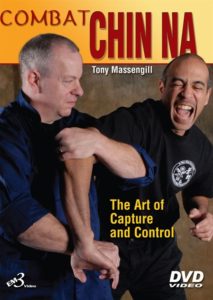What It’s About:
Master Tony Massengill, presents the mechanics of Chin Na, or the art of seizing, locking and breaking of the joints for control of an adversary at the point of contact or bridge.
Comments:
Normally the art of Chin Na, is not associated with Wing Chun or for that matter it’s not considered to have any relationship with Tai Chi Chuan either, particularly with the Chen system. Some may even think that Chi Sao cannot be used in push hands or Tau Sao, because it’s not Tai Chi! That is false! Although, its energy is somewhat different, that doesn’t mean it can’t be adapted. Martial art systems can be blended or changed, according to need or just through pure innovation, but I’m sure some may think this idea is close to heresy. However, what is important is to learn how to employ the method according to the principles that make them work. Its application includes three basic elements, Chi, the angle of force and movement.
 Sifu Massengill, does not attribute Chin Na to the Wing Chun system, Chin Na is indeed a separate art unto itself, however he does show how the art can be used in close contact while employing technique at the point of contact or in Wing Chun in what is considered the bridge. For those who are interested, Chin Na, according to Sifu Massengill, can be interpreted as such, Chin means to seize and Na, means to control. I can’t help but think how the word CHINA, relates to this term. Perhaps, we can interpret this as not only meaning control, but to unify. I think this interpretation is perhaps the essences of Chin Na…as you seize, and control you indeed must be unified with one’s adversary to guide the force and make the technique work.
Sifu Massengill, does not attribute Chin Na to the Wing Chun system, Chin Na is indeed a separate art unto itself, however he does show how the art can be used in close contact while employing technique at the point of contact or in Wing Chun in what is considered the bridge. For those who are interested, Chin Na, according to Sifu Massengill, can be interpreted as such, Chin means to seize and Na, means to control. I can’t help but think how the word CHINA, relates to this term. Perhaps, we can interpret this as not only meaning control, but to unify. I think this interpretation is perhaps the essences of Chin Na…as you seize, and control you indeed must be unified with one’s adversary to guide the force and make the technique work.
Master Massengill goes through a detailed demonstration of how Chin Na applications relate to the fighting environment. He quite aptly said there is the situation of “Hitting people with things and things hitting people.” In another words, in a street situation you can use the environment to throw a person into a wall or to the ground (concrete or asphalt can be very hard) with a joint lock or arm bar or whatever obstacles that might be there. Massengill, not only shows one how the basics in Chin Na work within the Wing Chun System, but offers sound advice while it’s practiced…that is cooperate with your partner during applications and don’t attempt to fully resist the technique otherwise you’ll likely get injured in the process. Now if you want to know how to get out of a joint lock the secret is simply, TO RELAX. The more one resist, the easier it is for one to be controlled. However, remember this one important point; partner practice is not a competition, but an opportunity for partners in practice to learn from each other.
For those who wish to enhance their skills this DVD would be an excellent investment for any Wing Chun practitioner. It is said that if you want to be a well rounded martial artist you must know how to use your hands, feet, which includes joint locks and throws. This DVD will provide you with the means of becoming a complete martial artist.
Technical Specifications:
Title: Tony Massengill – Combat Chin Na – The Art of Capture and Control
DVD Length: 1 hour 18 mins
Region: 0
Type: DVD-R
Format: NTSC
Video Quality: Above Average
Audio Quality: 5/5 (Professional)
Content Overview:
- Introduction
- The art of capture, Control and destruction.
- To Seize and Control
- Providing an opportunity to strike back.
- How application applies to the real world environment
- How to apply the force.
- Moving the joint to the outside of the body.
- Moving the joint to the inside of the body
- The “C” clamp analogy.
- Rotation of the hand toward the opponent’s body.
- Managing the Attack.
- Damage purposefully.
- Pressure is straight down.
- The proper position of the fingers.
- Using the position of the palm of the opponent.
- Chin Na is an incidental response.
- Creating the opportunity to attack.
- Finger Locks
- Position of the fingers.
- Small motion-control of two fingers.
- Small motion of the fingers toward the waist.
- Using the fighting environment to one’s advantage.
- Applications.
- Bridge contact to execute the techniques.
- Using the hand or arm to affect the movement of the technique.
- Playing the percentages.
- What is the training situation?
- Training situation scenarios.
- Control and punch
- Grasp, control and punch from either side.
- Chin Na with a cross grasp.
- Moving away from the punching hand.
- Creating different angles for applications-i.e. counters and attacks.
- Lean to exploit what is already there.
- Wu Sao hand
- Guan Sao Hand
- Double waist lock.
- Offensive applications
- Accountability and use of your weapons.
- Form a guarding position
- The centerline and the control of your opponent’s arms and hands.
- Long range and short range attacks.
- Using the Chin Na technique and not getting hit.
- Creating a realistic training environment.
- Dealing with the unexpected.
- The foundation of Chin Na techniques are from a strong base.
- Using your body correctly in establishing control.
- Destroying the opponent’s base.
- Look at Chin Na technique as an opportunity to escape.
- Partner Practice Essentials.
- Training device to determine the opportunity to use Chin Na
- Partners should know the purpose of the training drill.
- Know what you’re doing during the training session.
- Partner Practice is not a competition.
Reviewed by: George Hernandez
Date: May 14, 2011
DVD Bought on: Everything Wing Chun
